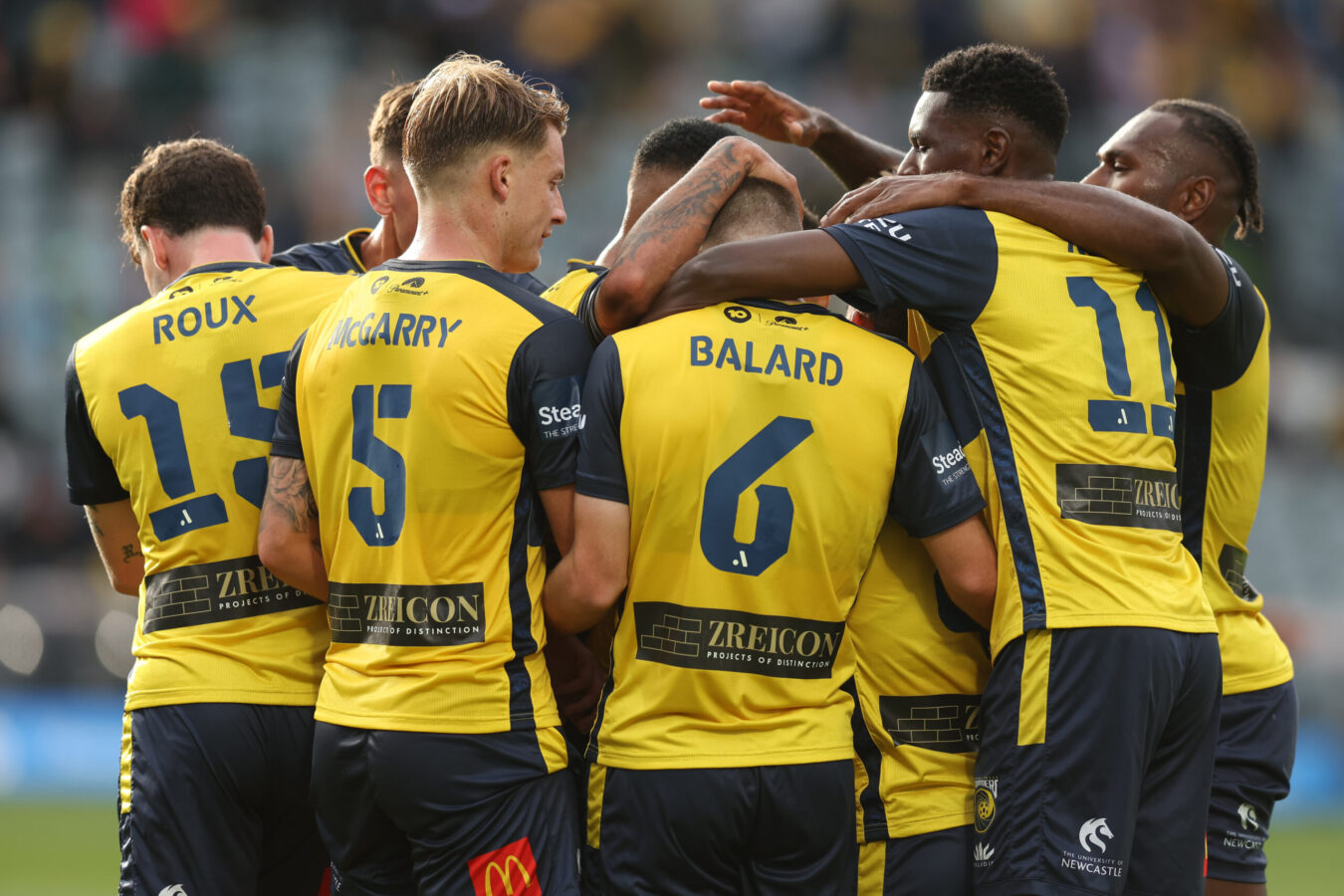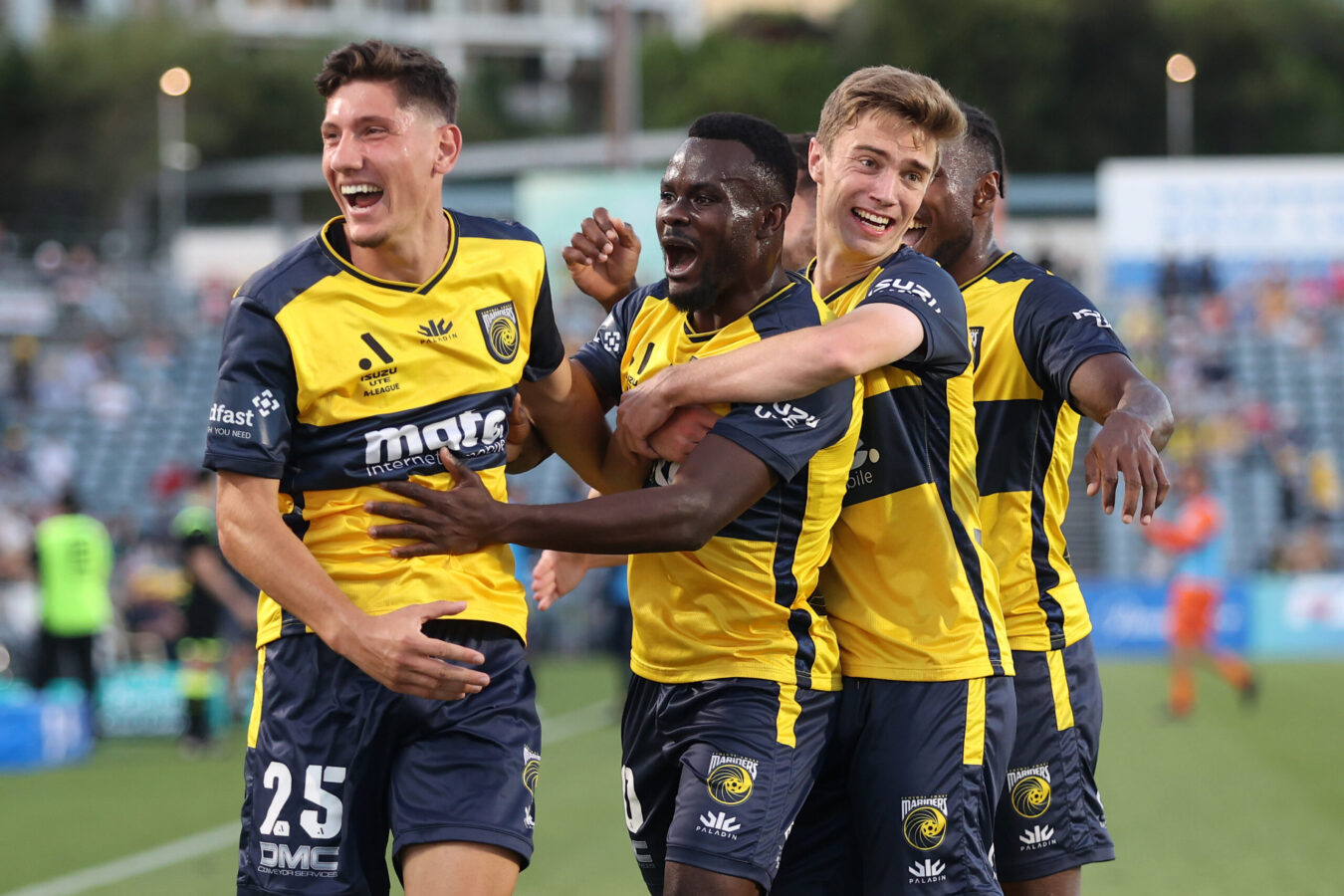Max Balard has had a breakout season in the A-League Men for the Central Coast Mariners.
The 22-year-old has featured in 24 matches for the semi-finalists this season, with the 2-1 win over Adelaide United on Saturday marking his 50th competition appearance.
Balard’s performances have been just one part of the broader success story of the Mariners this season, with the Gosford-based side securing second-place on the ladder – their highest finish since 2013. With a first-leg advantage in the semis, the Mariners are on the cusp of a first Grand Final appearance in a decade.
It’s clear that Balard has a bright future ahead of him in football. But it’s his pursuits off the pitch that are just as impressive as his promising football career.
Balard speaks fluent French, has picked up Spanish to converse with his teammates and coaches, recently graduated from university with a double degree, is pursuing his coaching badges and has his sights set on a call-up for the Olyroos.
The Mariners midfielder caught up with pfa.net.au to discuss how he manages his time on and off the pitch and his ambitions for the future.
Study: a family affair
Balard says he’s always been drawn to study, which was encouraged by a good dose of support from his parents.
“I always studied a lot when I was young,” Balard said. “I made sure that my grades were good, and it turned out it was doing all right. My parents have always emphasised the importance of study and have really supported me.
“I studied overseas for a while as our family was based in Asia, and then finished my HSC here in Australia. I received a 94.2 ATAR and that score helped me to transition into uni, where I’ve recently completed a Bachelor of Economics and Commerce at UNSW.”
Football and education: a juggling act
Balard’s school grades were healthy, as was his appetite for further study.
But he encountered some early challenges in maintaining his course work when he transitioned from a youth contract in the Mariners academy to the first team.
“The first two years I was in the Mariners youth team and [study] was fine to manage because we trained from 6.45am to 9am, so I had the rest of the day to study.
“But once I stepped into the A-League, it was a bit different. You don’t have as much time, and you need good time management skills.
“You have to fit assessments, quizzes, revision and you have to make sacrifices to make that happen. But the sacrifice is worth it at the end when you graduate.”

A supportive environment
A key to Balard’s capacity to knuckle down with both his study and his professional career were the supportive environments provided by his family, university and club, as well as accessing resources through the PFA.
“UNSW were really great with me: I managed to get an elite athlete scholarship with them, so they helped me manage my timetable around training, especially when I had exams. The Mariners were cool with that too, so that really helped a lot.
“The PFA helped out with education grants, which helped with my uni fees and buying expensive textbooks.”

Study creates a safety net and balance
While Balard’s eagerness to pursue study while breaking into the professional game was centred on continued learning and development, he quickly discovered that he had built a new safety net – and balance in his life.
“I started [studying uni] as a continuation from doing well at school. At the time you’re not sure if you’ll make it as a professional in the A-League. I decided to continue with it once I made it to the A-League because it’s now something on my CV and no one can take that off you.
“You also get a bit of balance in your life. I highly recommend to people within football, or even outside of football, to pursue other avenues while they’re pursuing their career, because it helps to have a bit of balance and helps with your mental wellbeing.”
Multilingual Max
An added string to Balard’s bow is that he speaks three languages; English and French fluently, and what he describes as ‘broken Spanish’, which has helped him communicate with his teammates.
“Both my parents are French, so it was easy to pick it up. We speak it at home, but over the years I have also learned a bit of Spanish at school.
“Now I try to chat with the boys in the team that speak a bit of Spanish or Portuguese: we try to make through with our broken Spanish!
“Moresche, Marco Tulio, and assistant coach, Sergio [Raimundo] all speak either Spanish or Portuguese, and we used to have Marco Ureña, who is Costa Rican.”

Performing on and off the pitch
After a 2-1 win in Adelaide, Balard hopes the Mariners can deliver a second-leg result in front of their home fans this Saturday. It’s his sole focus for the next couple of weeks. But as always, off-field ambitions are never far from Balard’s mind.
“We’ve had an amazing season. The boys are really happy that we’ve managed to make it to the semis without having to play an elimination final like last year.
“I think it’s a great thing for the club: it’s the closest we’ve been for a long time to seeing the success that the club had ten years ago when they won the final.
“I think it’s great for the club and the community and the boys are doing amazing and I’m super happy of how this season has gone. For the next couple of weeks I’ll be focusing on my football and push as hard as we can to make the Grand Final.
“After that my goal is to make that Olyroos squad next year for the Olympics [Paris 2024]. I’m also looking to do a coaching course [through the PFA] because I love football and that could be another avenue after my (playing) career.
“The PFA has managed to organise an amazing program and help out the players with making it a shorter course at a time where it suits all the players that are doing it during the offseason.”







